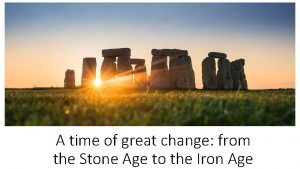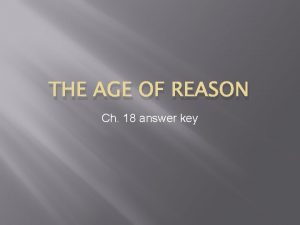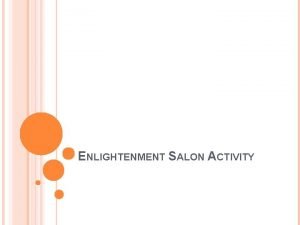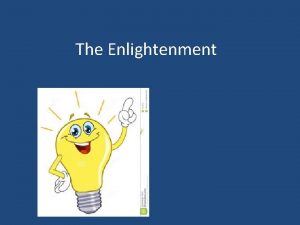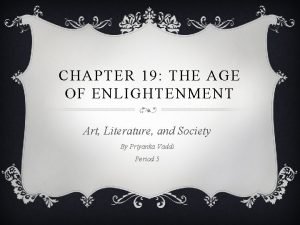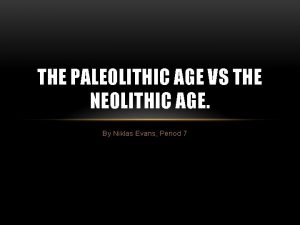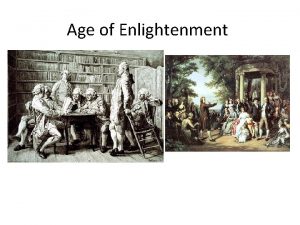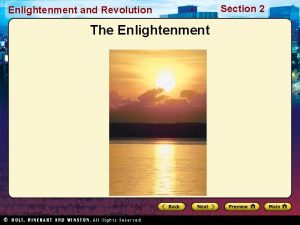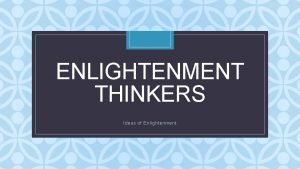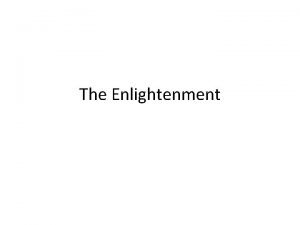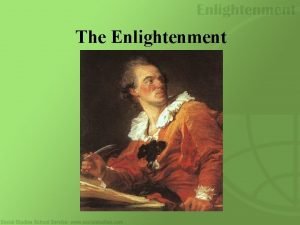The Age of Enlightenment THE AGE OF ENLIGHTENMENT






- Slides: 6

The Age of Enlightenment THE AGE OF ENLIGHTENMENT WAS A PERIOD IN THE 18 TH CENTURY IN WHICH SCIENTISTS AND PHILOSOPHERS IN EUROPE AND NORTH AMERICA BEGAN TO EXAMINE THE WORLD THROUGH REASON OR HUMAN INTELLECT RATHER THAN THROUGH SPIRITUAL FAITH OR RELIGION. IT PROPOSED EQUALITY OF NORMAL CITIZENS TO THEIR LEADERS.

Literature As a result of this era largely referring to the logic and rationality (because people now based their knowledge on science), mostly nonfiction texts were produced, especially poetry that held much reason. Many people saw little point in writing about made up worlds, however many literary critics argue that this era saw the rise of the novel and this grew even more popular; as it is today. Before this era, literature was mainly available to only the wealthiest people. However, during the change the price of such decreased which meant the general public were able to access them. This lead to the literacy rates of the eighteenth century rising rapidly as a result of more people reading.

Voltaire and Jean-Jacques Rousseau were both European writers who were very much the leaders of Enlightenment literature. Rousseau had a very strong belief in reforming social expectations and he evented what is known today as the autobiography. However, his most important work was Emilie; a piece of nonfiction that promoted the importance of extensive and liberal education (education based on both the humanities and the sciences) as the main action for creating good citizens. After he died, Rousseau’s work on empowering society and democracy remained influential for a very long time.

Voltaire proposed similar political reasoning as Rousseau. However, he experimented with sarcasm and dry wit in order to entertain his readers whilst arguing for reformation. Voltaire, however was only the pen name of Francois-Marie Arouet. The main reasoning behind having a pen name was to avoid a massive amount of criticism as a result of himself, like Rousseau, holding harsh views on the Church. Together, Voltaire and Rousseau are the most well-known of a collective of European writers working to promote Enlightenment philosophy, all for the sake of making their world a better and fairer place.

Novels It was especially difficult for writers in this period as they were living in the shadow of Shakespeare therefore their work would be automatically compared to his. Johnathon Swift was one of the most well remembered writers of literature in the age of enlightenment. He wrote Gulliver’s Travels, which not only cemented himself in English literature history but also the world. His charm and humour inspired and entertained his audience. Unlike many other writes who tackled social injustice head on, Swift preferred inventing trickery of the allegory to do it in much more of a subtle way. It was a very clever idea and each of the societies that Gulliver entered represented one of those in the eighteenth century.

The need for a change in society was the main focus for these writers of literature at this time. However, despite them all aiming for the same thing there were many different ways for them to do so. Voltaire chose to make it entertaining therefore his readers would be more interested, however Rousseau opposed to a very informative and direct technique. Despite their French nationalities, both these authors had major influences in England.
